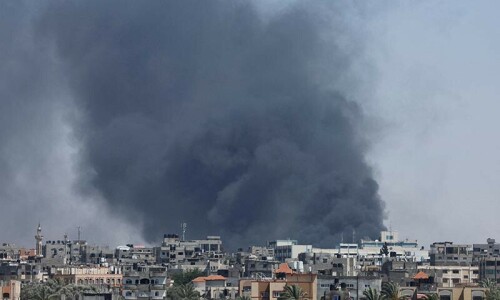The Punjab government appears to be right on track in its effort to maintain the growth momentum in provincial tax revenue.
This is indicated by the 30pc rise in the collection of general sales tax on services during the first quarter of the present financial year, to September.
But many consider the government’s “effort to exploit the real tax potential of the province painfully slow, and its focus on the increasing burden of indirect taxes at the cost of middle class households, misplaced.”
The Punjab Revenue Authority (PRA) has collected Rs16.84bn as sales tax on services, which is the single largest source of provincial tax revenue in the first quarter of the ongoing fiscal year, compared with Rs12.92bn during the corresponding period last year.
The authority is targeting a sales tax on services revenue of Rs86.50bn during this fiscal, up by 20pc from the original estimate of Rs72bn and 40pc from the actual collection of Rs62bn.
The sales tax on service collected during the last financial year constituted slightly more than two-fifth of the total direct and indirect provincial tax revenues of Rs150.78bn. It remains the biggest source of indirect tax, and the Punjab government plans to extend its scope and coverage over the years for boosting its revenues.
Similarly, the excise and taxation department has reported a growth of over 16pc in its collection to Rs9bn from Rs7.7bn a year ago.
The government has set a target of Rs29.5bn for the excise and taxation department for the current fiscal, which is 18pc higher than the original estimate of Rs25bn and 25pc from actual collection last year.
Overall, the provincial government intends to increase its tax collection to Rs184.44bn, or 15pc greater than original estimates of Rs162.59bn and 22pc higher than actual collection of Rs150.59bn.
Officials claim that the increase in growth of tax collection is a direct result of the reforms being implemented in the province. Punjab finance minister Ayesha Ghaus-Pasha has recently said the province’s revenue receipts have grown by 45pc (last year), while its development expenditure by 31pc, as a result of reforms in the tax system.
But financial experts like Mubashar Bashir, who has extensive experience of working in both the private and public sector, thinks the process is painfully slow. He believes that Punjab has an enormous potential to grow its tax revenues, and quickly.
“… the lack of political will and capacity are major impediments in the way of raising provincial tax revenues,” he told Dawn last week. He is also critical of the provincial government’s strategy to push indirect taxes, ignoring the potential sources of substantial direct tax revenues like agriculture income tax.
“Indirect taxes hurt only the middle class people, with the wealthy escaping the net. I have heard that the government is working on reforming agriculture income tax. But the question is whether this ‘work’ will ever be concluded and the tax collected from the wealthy and powerful farmers,” Mubashar, who now works for a microfinance bank in Lahore, wondered.
Indirect taxes of Rs34.24bn, mobilised last financial year, constituted a little more than a fifth of the total provincial tax receipts. Their share — Rs42.14bn — in the current year’s tax target remains unchanged with more focus on raising sales tax on services.
The provincial finance department officials insist that the provinces don’t have much room for increasing direct tax receipts in a country where nobody is willing to pay his or her share of taxes.
“The major direct taxes remain with the federal government and it, too, has been unable to raise their share in its tax revenues. How can you then expect a province to pull it off?” one official asked. He said that even the efforts of the provincial government to indirectly tax the lavish living of the elite were thwarted by extensive litigation by the ‘affected’ people.
As a consequence, officials say, the province largely remained dependent on revenues from the federal divisible pool under the national finance commission (NFC) award with provincial taxes historically forming less than a tenth of its total revenues.
Published in Dawn, Business & Finance weekly, October 31st, 2016












































